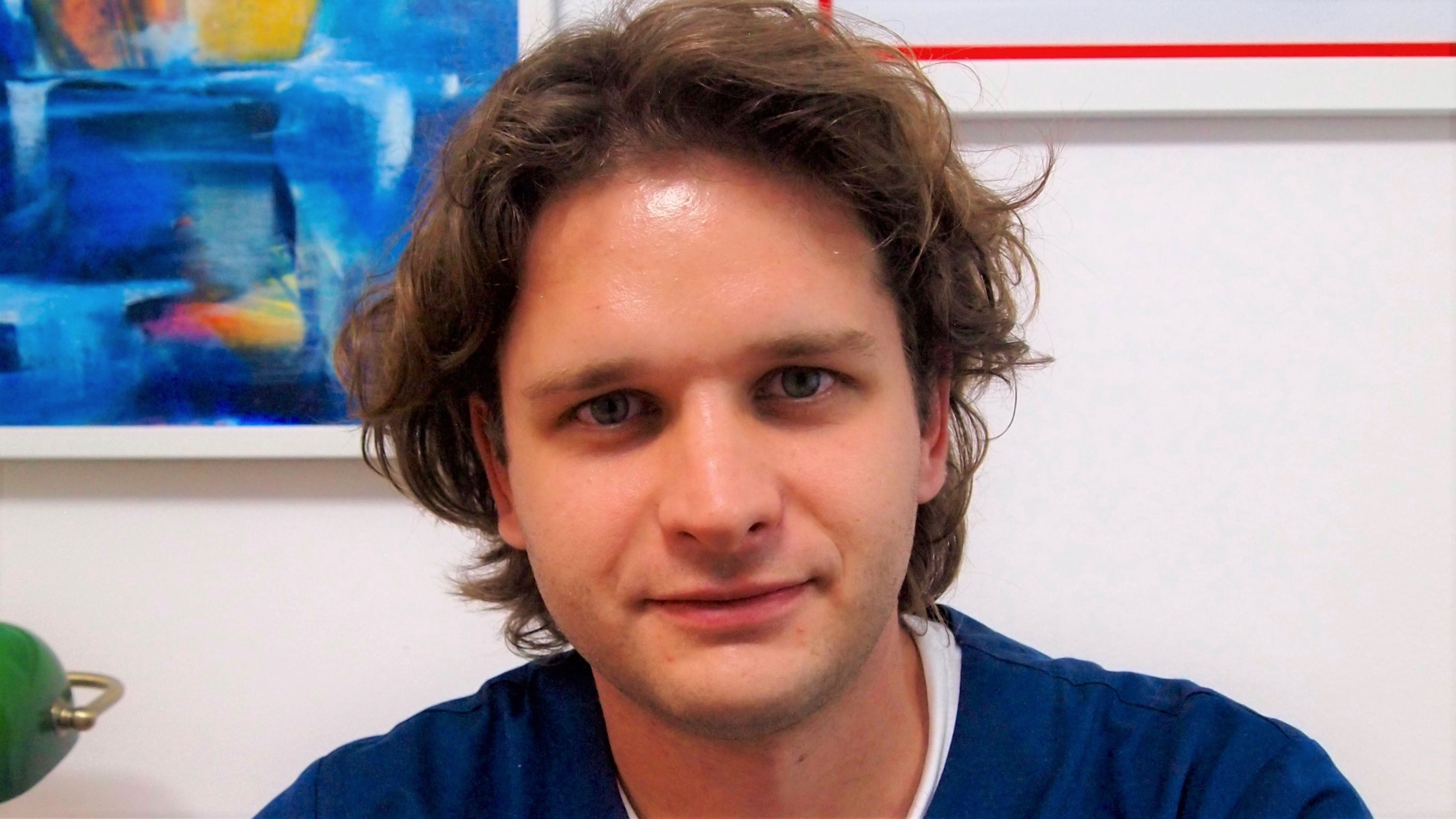Young GI Blog
European Specialty Examination in Gastroenterology and Hepatology (ESEGH)
September 11, 2023 | Viktor Domislovic

Viktor Domislovic, MD, PhD
Department of Gastroenterology and Hepatology
University Hospital Centre Zagreb
Please tell us about your career pathway and your specific area of interest.
Since I was a student, I have been involved in scientific work, mostly epidemiological observational studies at first in the field of nephrology, but later became focused on gastroenterology and hepatology from the time I have become a resident at the University Hospital Centre Zagreb. During my residency, I finished my postdoctoral study at the University of Zagreb, School of Medicine in the field of Biomedicine and Health Sciences with thesis “Biomarkers of degradation and formation of collagen III, IV and V in serum as markers of inflammatory activity in patients with Inflammatory Bowel Disease”. In addition, very early on in my career I was part of several international scientific multicentric projects such as the European Inflammatory Bowel Disease population-based inception cohort – EpiIBD study group and Lemann Index Validation Study – Cumulative Damage Score in Crohn’s Disease, but have also been involved in various projects focused on IBD, clinical nutrition, NAFLD, endoscopy etc. Scientific work has expanded my understanding of current medical knowledge and provided a great opportunity for learning and connecting with other colleagues. In addition to the scientific work, which was mainly done in my free time, regular clinical work has been challenging and gradually during residency became my primary area of interest. During residency and in line with work obligations I have been involved in a wide range of areas focused on IBD, endoscopy, hepatology, and ultrasound but also regularly participated at European congresses such as UEG Week and ECCO, and therefore have decided to challenge myself even further and take the European Specialty Exam in Gastroenterology and Hepatology (ESEGH).
Could you provide some information about ESEGH?
The European Specialty Examination in Gastroenterology and Hepatology (ESEGH) is essential and highly esteemed in the field of gastroenterology and hepatology. Recognized across Europe and beyond, it serves as a vital benchmark for medical professionals in these disciplines, assessing their knowledge, understanding, clinical decision-making, and rationale management of complex clinical cases. As a standardized test, ESEGH helps in ensuring uniformity in the quality of healthcare across Europe and even broader. Those who pass the examination demonstrate a high level of proficiency, reflecting the excellence required to provide high-level patient care. The examination encompasses a broad array of topics, including the diagnosis, management, pathophysiology, pathology, radiology, etc. of various gastrointestinal and liver diseases, underlining the complexity of these fields. More than just a qualification, ESEGH represents a significant milestone in a medical practitioner's career, marking a commitment to professional growth within gastroenterology and hepatology. It serves as a gateway to further opportunities in research, clinical practice, and education, becoming a symbol of prestige and accomplishment. By fostering a culture of continuous learning, ESEGH aligns with the evolving needs of healthcare and stands as reference point for aspiring specialists in gastroenterology and hepatology.
It is also quite interesting why passing the ESEGH was important personally for you.
Passing the European Specialty Examination in Gastroenterology and Hepatology (ESEGH) marked a defining moment in my professional journey. Not only was it a rigorous assessment of my knowledge and skills in my chosen field, but it also signified a personal achievement that went beyond mere certification. From a professional standpoint, the ESEGH validated my competence and dedication to the field of gastroenterology and hepatology. It attested to my understanding of medical procedures, diagnostic techniques, patient care, and the latest developments in treatment of gastrointestinal diseases. The exam served as a comprehensive review, helping me to identify my strengths and weaknesses which represent opportunities for further development and growth. On a personal level, the ESEGH represented a culmination of years of hard work, relentless pursuit of excellence, and an unwavering commitment to lifelong learning. The preparation process required intense focus, collaboration with mentors and peers, careful reflection on my clinical experiences and of course, a lot of support from the environment. Passing the exam reinforced my belief in my capabilities and the choices I had made in my career path. Furthermore, achieving this certification opened new doors for collaboration with international experts, participation in cutting-edge research, and opportunities to contribute to medical education. In essence, passing the ESEGH was not just an academic milestone but a deeply personal achievement. It provided a strong foundation for my ongoing commitment to providing the highest quality care to my patients and continuing to innovate and grow within this dynamic field.
Could you tell us what GI doctors should expect from the ESEGH (preparation and exam itself)?
Preparing for ESEGH is an interesting but long journey. Here are several points on what potential candidates should expect regarding preparation:
- Comprehensive Coverage: The ESEGH covers a wide range of topics within gastroenterology, hepatology, and related areas, including diagnostics, therapeutics, pathophysiology, pathology, radiology, and clinical management.
- Intensive Study: Aspiring candidates should expect to invest significant time in self-study, reading core textbooks, engaging with the latest research publications, utilizing online resources such as courses, webinars etc.
- Practical Experience: Although only theoretical knowledge is tested, practical experience gained during residency in terms of endoscopy, ultrasound, radiology etc. are extremely helpful in understanding theory and solving clinical cases that are questioned.
- Mock Exams and Review Courses: Many find attending review courses and taking mock exams beneficial to simulate exam conditions and identify areas for improvement.
- Collaborative Learning: Engaging with colleagues, mentors, and online communities can enhance learning and provide support during preparation.
And here are several tips on what can be expected during the exam:
- Format and Structure: The ESEGH typically includes various question types such as multiple-choice questions (MCQs), the majority of which are clinical scenario based.
- Time Management: The exam is timed, so candidates must practice managing time effectively, balancing speed with accuracy.
- High Standards: Expect a demanding examination that requires not just factual recall but critical thinking, problem-solving, and clinical judgment.
- Relevance to Practice: The exam is designed to align closely with real-world clinical practice, making it highly relevant and applicable.
And finally, what is often neglected is having support from your environment, family and friends, building emotional and physical stamina, maintaining a healthy lifestyle and preventing burnout. These are in my opinion crucial and of utmost importance and future participants must be aware of it.
In conclusion, the ESEGH is a demanding yet enriching experience that requires intensive preparation, both theoretical and practical. It is a robust evaluation of a candidate's expertise in gastroenterology and hepatology, reflecting not just academic knowledge but clinical judgment, and commitment to the field. The rewards, both personal and professional, are well worth the effort. Finally, education does not stop with ESEGH, on the contrary, this is just a beginning of future journey in gastroenterology and hepatology which yet must be upgraded and improved in regular clinical work.




Please log in with your myUEG account to post comments.